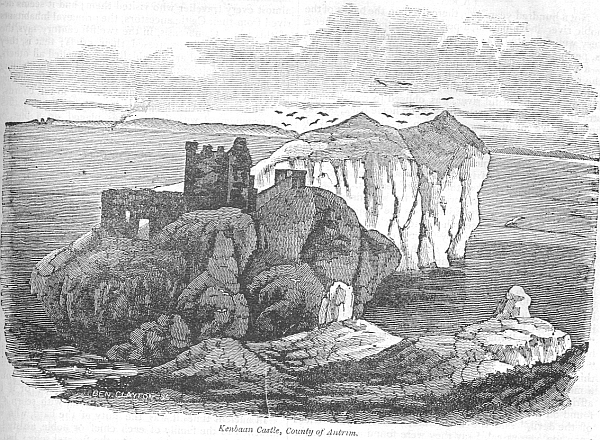Kenbaan (Kenbane) Castle, County Antrim
From the Dublin Penny Journal, Volume 1, Number 31, January 26, 1833

About two miles northwest of the town of Ballycastle, county of Antrim, on a narrow peninsula, composed of white limestone, which projects its perpendicular front into the sea, are the ruins of the ancient castle of Kenbaan, or the White Promontory--a name derived from that of the precipitous cliff on which it stands.
At present, little remains of this building except a part of the massy walls of the tower or keep, which from its bold and romantic situation, adds not a little to the beauty of the scenery of this wonderful coast. During summer, it is often frequented by parties, and the scene of many a festive collation; where instead of the grim warder pacing at its gate, are seen inside its portal the "fairest of the fair."
Tradition states this building to have been erected by the Irish sept of Mc. Hendric; but as its scanty ruins bear a striking resemblance to those castles reared by the first English settlers on the coast from the Boyne to the Bann, we think its erection may with greater probability be ascribed to them, or if it be an Irish castle, it is at least erected on the plan of those of the adventurers.
Be this as it may, about the beginning of the reign of Queen Elizabeth, we find it held by the Scottish clan of Mac Alister, who arrived in Ireland with the Mac Donnells from Cantyre. In 1568, the Mac Alisters entered into a conspiracy against the English quartered in those parts, and in an encounter which took place, two English horsemen were slain; and soon after, "Ranuel Oge Mac Alister Caraghe," chief of the Mac Alisters, was killed in revenge, by some English soldiers. On this commotion, Captain William Piers, governor of Carrickfergus, and seneschal of the county of Antrim, proceeded with some troops to the Glynns, where he made three of the Mac Alisters prisoners, one of whom he hung in chains; and Alexander, chief of that sept, making his submission about this time, the Mac Alisters sunk beneath the English power. Many of this name are still to be found in the Glynns.
Carrickfergus,
S. M'S. (Samuel M`Skimin)
